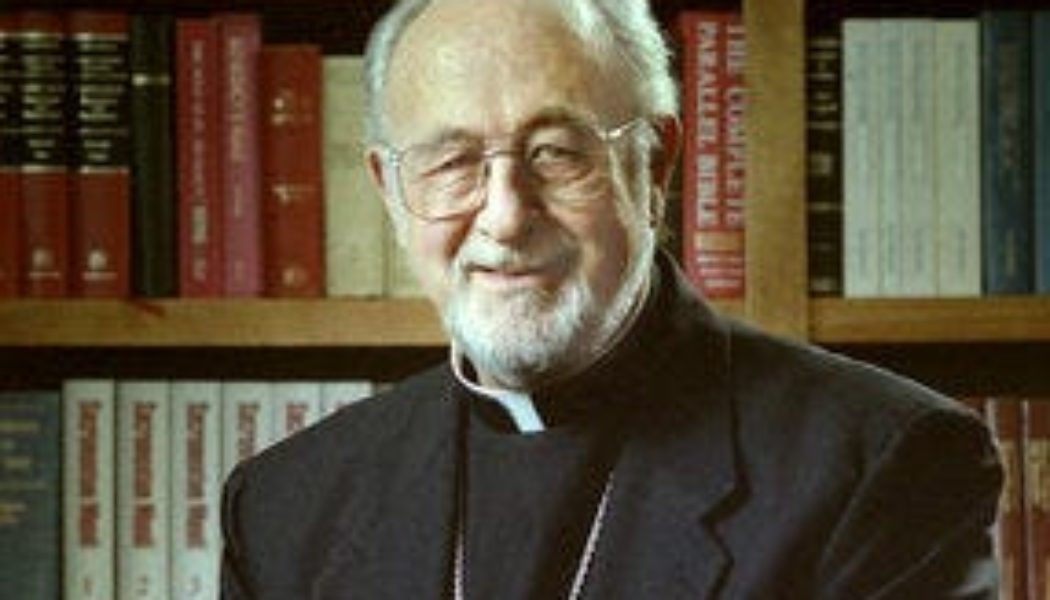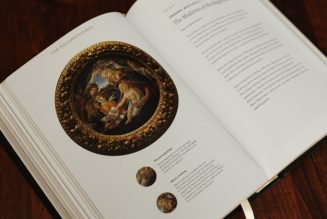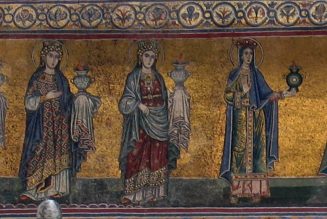Hey everybody,
I tried to be responsible. I had big plans to get ahead of the game. I drafted out large sections of The Tuesday Pillar Post on Friday afternoon, four whole days ago, so that I’d have time to edit, polish, and hone that prose to perfection, just for love of you, dear readers.
But then late Monday evening – after a Scout meeting, some Nerf gun time, and dinner – I decided that too much news has happened since Friday; I needed to scrap those pre-written sections and start from scratch.
So if you come across the usual number of typos, or some rambling bits that might have been edited into phrasing more graceful or eloquent, please know that I really did try to give my prose some time to breathe.
And then, well, things just started happening in the world. Journalism is the first draft of history and all that!
So let’s get to it!
Cardinal Angelo Becciu was once the pontiff’s right-hand man, until he became mired in financial scandal, and in 2020 was dismissed from the privileges that come with being a cardinal. He is now on trial in the Vatican City State, on charges of embezzlement and abuse of office, conspiracy, and subornation of witnesses.
He has been mostly a persona non grata in the last few years.
Until this week, apparently.
In a bit of shocking news, Becciu announced while offering Mass on Sunday that Pope Francis had just called him up, invited him to attend a consistory, or meeting, of cardinals on Saturday, and told him his rights and privileges as a cardinal would be reinstated.
Becciu, again, is still on trial. So here’s the more shocking news. The Vatican’s state media apparatus confirmed the cardinal’s announcement on Monday — at least part of it. Vatican Media announced that Becciu will indeed be attending the cardinals’ consistory, at the request of Pope Francis.
Again, Becciu is still on trial.
So, an apparent message from Pope Francis that his censure has been lifted is a surprise – and a confusing one.
What does all this mean? Ed wrote a full analysis, which you should read.
But if you want my short take, it’s this, in a few points-
-
It’s possible that Becciu is exaggerating about the pope’s plans to “reinstate” him. The cardinal is given to hyperbole. Recall that he sued the Italian media for ruining his chance of becoming pope. But if he’s not exaggerating, and the pope does plan to restore Becciu to full status, it’s possible that Becciu could participate in the next papal conclave – the meeting to elect the next pope – while he is still a defendant in a Vatican City trial for extortion.
Because Becciu, again, is still on trial.
-
It’s possible, and perhaps most likely, that Pope Francis invited Becciu to the consistory, and maybe even made some overtures toward “reinstatement” out of a sense of pity for Becciu – that would be in character with Pope Francis, who has expressed sympathy for the cardinal in the past, even offering Holy Thursday Mass with him in 2021.
-
At the same time, Becciu is still on trial. And a major gesture of support from Pope Francis certainly could throw the court proceedings into some disarray — however independent the judiciary is, the pope is still the chief judge, and sovereign, of Vatican City State — so signaling some “pardon” for Becciu’s alleged crimes causes confusion.
-
Conspiracy-minded folks will soon begin to say that Francis is “reinstating” Becciu because he is concerned that Becciu will speak openly about the pontiff’s handling of Bishop Oscar Zanchetta or other controversial matters, about which Becciu would have very specific information, because of his one-time role as a close Francis deputy. The cardinal does have a lot of information about controversial elements of the papacy, but I’m not conspiracy-minded — I tend to think that if Francis is actually “restoring” Becciu to his former status, it’s out of some sense of pity for the accused former official.
The problem with that? Here’s what Francis wrote wisely just last year: “The failure to understand the close connection that exists in the Church between the exercise of love and the application of penal discipline whenever circumstances and justice require it, has caused much harm in the past.”
Becciu is, after all, still on trial.
But those are a few quick thoughts. For a more exhaustive treatment, read our initial report on Becciu’s announcement here, and then read Ed’s comprehensive and thoughtful analysis.
Next, news about Catholic financial figures closer to home, and some exclusive reporting you’ll read only at The Pillar.
A federal judge ruled this month that a woman can sue Visa for knowingly enabling the distribution of child pornography by Mindgeek, the company which operates Pornhub, YouPorn, and a dozen other pornography websites.
The woman, Serena Fleites, argues that when a video depicting her, as a minor, being sexually abused, was uploaded to Pornhub, the company made it extremely difficult to remove — that Mindgeek profits, by design, from tens of thousands of videos on its sites which depict child sexual abuse, and the rape of adults as well.
Fleites presents a pretty good amount of evidence indicating that Visa continued to do business with Mindgeek even after it was aware of the company’s criminal activity, and even after victims of child abuse wrote to Visa’s CEO directly, asking him to stop doing business with the company.
While Visa announced this month it would limit its engagement with Mindgeek – as it also did in 2020 – child safety advocates point out that the company is still – today – knowingly providing payment services to other pornography sites known to be trafficking in videos of “non-consensual” sexual acts – rape – and in child pornography.
Visa’s CEO has not responded to that fact. He has instead pivoted the conversation to defend his company’s business dealings with legal purveyors of pornography.
That CEO is Alfred Kelly, a Catholic, who currently serves as a trustee at Boston College and at the seminary of the Archdiocese of New York, and on the finance council of the New York archdiocese, which sets the archdiocesan budget and approves major archdiocesan financial transactions. In 2015, he chaired the planning commission for the pope’s visit to New York.
The Pillar asked Boston College and the New York archdiocese whether his approach to pornography might present an issue for an institutional leader of Catholic organizations. Boston College did not respond, and the New York archdiocese said it could not comment because of pending litigation.
This is an important story. Read it here.
The Holy See will hold a press conference Friday to explain the next phase – the “continental phase” – of the Church’s global synod on synodality, at which representatives of bishops from each continent will get together to discuss the synod discernment in their own countries, and the Church’s working document for its 2023 global meeting of bishops.
Yesterday, Luke Coppen took a long, thorough, and fascinating look at what issues will likely emerge when the European bishops get together — and pointed to a stark disparity between synodal views in Western Europe, and those coming from the East.
Here’s a preview:
The division of Europe into East and West is crude, but it is also useful because it highlights important differences between countries that experienced decades of communism and those where capitalism has held sway.
European Catholic communities that suffered under communism have evolved in different ways to those that passed through the 20th century without long-lasting state-sponsored persecution.
The divide between Catholics in Eastern and Western Europe can arguably be seen in responses to the German “synodal way.” The controversial initiative is expected to close next year with a call for radical changes to Church teaching, practice, and structures.
The Bosnian Cardinal Vinko Puljić said last year that the synodal way’s proposals were alien to Catholics who had survived communism.
“A Church that has weathered the challenge of communism does not have such exotic ideas. Indeed, such attitudes offend and astonish our believers,” he commented. “We cannot understand a Church in which sacrifice is a foreign word and there is a Jesus without a cross.”
Read Luke’s excellent analysis, right here.
—
And then, speaking of the synod on synodality, Italy’s bishops released their “national synthesis document” last week. The country saw about 500,000 people participate in the synod — one of the largest participation cohorts to be reported by any country thus far.
Though, on the other hand, 500,000 is only slightly more than 1% of Italy’s total Catholic population. When the pope spoke with synod organizers for the Diocese of Rome last year, he urged them to think big, “to pass beyond the 3 or 4 percent that are closest to us.”
One percent, of course, is less than that. But if you’re curious what 500,000 Italians think about synodality and the life of the Church, read all about it!
Next, here’s a powerful interview you should read, from The Pillar’s Charlie Camosy.
Today she is a passionate pro-life advocate, with an emphasis on the way abortion has impacted communities of Black Americans. Her story, and her message, are worth hearing.
Especially right now. Because Riddick talked with us about the way her words, and viewpoints, were twisted in a recent interview with the Washington Post:
The Washington Post falsely ascribed to me the view that the Court’s decision in Dobbs will open the door to forced sterilizations by removing constitutional protections for women’s bodily autonomy.
My position is, in fact, the opposite.
I worry instead that progressives will now move to limit Black women’s fertility and prevent the births of Black children by other coercive means, including sterilization.
…
The Washington Post falsely portrayed me as supporting a pro-choice agenda even though they clearly knew, and I stated in the interview, that I am against abortion and am pro-life.
You should know Elaine Riddick’s story. Her voice is worth hearing.
Finally, Archbishop Rembert Weakland, formerly of Milwaukee, died Monday. He was 95 years old.
Weakland is widely regarded as one of the most ignominious Churchmen in American Catholic history.
The bishop was, in his day, the lion of the American Catholic left — he called for the ordination of women, excoriated the Church’s teaching on sexuality and contraception, and urged his priests to conduct “experiments” in living – urging them out of their parish rectories, and into apartments instead. He was regarded as a liturgical “innovator” par excellence.
While he advocated for a broader social safety net for the poor, Weakland also lobbied to give abuse victims less time to file in court, and urged “flexibility” on legal tolerance for abortion.
But while his record as a bishop and teacher of the faith might have otherwise been debated among Catholics, the details of his personal life, and his handling of sexual abuse, overshadowed anything else that might be said of him.
He was publicly accused in 2002 of sexually assaulting a younger man in the 1980s, and of later paying him off with “hush money,” as he called it, taken from the coffers of the Archdiocese of Milwaukee – money which he paid back, years later, with earnings from his book sales.
Weakland eventually apologized for the “scandal” of his conduct, but insisted things were consensual. While the man said he’d been raped by Weakland, the archbishop said he was “in love,” and he regarded the whole thing as “an affair.”
In fact, Weakland admitted in 2009 to having several relationships with men during his tenure as an archbishop, which he chalked up to “loneliness that became very strong.”
Beyond the personal allegation of sexual assault, Weakland has become associated with the worst excesses of the Church’s institutional cover-up of sexual abuse.
Famously, the bishop is often remembered for a 1993 admission that he shredded reports on abusive priests after he had read them. For a bishop notorious for covering up abuse, the anecdote seems perfectly illustrious. As it happens, the bishop’s actual practice was strange, but not exactly what it sounds like – Weakland was not admitting to shredding the reports themselves, but the copies sent to his office – the files themselves were logged elsewhere.
But the broader picture – that Weakland was aggressive in his efforts to cover up sexual abuse allegation – is indisputable.
As Archbishop of Milwaukee, he frequently oversaw the transfer of sexually abusive priests between parishes, has been accused of castigating victims, and coercing them into signing settlement agreements which prevented abusers from seeing justice, and is known for suing abuse victims to recover archdiocesan court costs.
“No bishop before or after Weakland has deployed such an aggressive tactic to intimidate and silence victims,” the advocacy group Nate’s Mission said Monday.
Once the global primate of the Benedictine order, his own monastery, where he had once been abbot, told Weakland in his retirement that he was not welcome there.
His name was removed from the chancery building in Milwaukee in 2019.
His funeral arrangements have not yet been announced. But I hope, sincerely, that you will join me in praying for Archbishop Weakland’s soul.
I hope also you’ll permit me to say that I pray another Weakland is not soon visited upon the Church in the U.S.
And, actually, that’s a lot of what we’re doing here at The Pillar.
I have worked in the life of the Church my entire adult life. I have known saints in the sacred presbyterate and working in chanceries, and men of extraordinary virtue leading the Church as bishops.
I have also seen things done behind closed doors that prick my conscience.
And, reader, after 2018, it became clear to Ed and me that a mechanism of journalistic public accountability is sorely needed in the life of the Church— that she suffers from its absence.
And not only a mechanism of journalist public accountability, but an informed mechanism, one with the capacity to understand how ecclesiastical administration and governance is supposed to work – how the Church prescribes its own function, and to see when things are deviating from those norms.
We’re not out to play “gotcha” with “bad bishops.” We’re not out to “hurt the Church.” We don’t want to make a sensation or gin up scandal.
On the contrary, we love the Church, and we want to see both her reform and renewal. We want to raise our children to be saints, in the communion of our mother, the Church.
And we know that Weakland was able to make harmful financial and administrative decisions – like lifting $450k from the archdiocesan accounts to pay off an accuser – because no one was watching with informed, independent eyes — and because few people with the right information felt they could trust either the secular or the Catholic media to get the story right.
We want to be the place that gets the story right. We think a bit of light shed at the beginning of a problem can prevent a great deal of darkness. That’s a big part of what we’re trying to do here — with sexual abuse and misconduct, with financial affairs at home and at the Vatican, with ecclesiastical governance in seminaries and chanceries and religious institutions. And yes, with the exercise of the munus docendi — the Church’s sacred call to teach the Gospel
It can feel, to be candid, a bit quixotic to aim daily for public ecclesiastical accountability long after the groundswell of frustration that arose in 2018— and often with little official or institutional result and less encouragement, at least in the short term.
And a lot of our public accountability work has shifted to asking whether the solutions posed in the Church are actually working — is Vos estis doing its thing? Are financial reforms? Is the propaedeutic year, for that matter? Do we have technology accountability? What else do we need?
It often happens that in a crisis, the Church offers some promised reform policy — but we think it matters that we keep watching that reform policy in action, that we see if it actually engenders reform. Those questions aren’t going away anytime soon.
Still we ask a lot of you readers — we report on difficult stuff, and we try to do it soberly, and we ask you to endure a lot of looks under a lot of rocks. So thanks for that.
But we think public accountability matters. It brings in the light. It even, I sincerely believe, has a deterrent effect. It aims to help prevent the nest of complicated problems Milwaukee faced after Weakland — and the souls harmed in the process — and to do so out of love for the Church.
We think that will pay dividends for the mission of the Gospel. And – if you’re reading this – you probably do too. But, as I tell you so often – doing it well depends on your subscription. So please consider it. I promise you, we’re not getting rich off this job — we probably could have done better financially staying at our pre-Pillar jobs. But we want to do more of the work that matters, because the tragic story of Archbishop Weakland has long and tragic consequences for the Church.
Without public accountability, it becomes too easy for Churchmen, like all institutional leaders, everywhere – to excuse systematic malfeasance because of personal loyalty or ideological alliance. That’s how systematic negligence gets tolerated.
All of us have sinned, of course. And a person is not defined by his sin. But the institutional harm that comes from institutionalizing tolerance, evasion, and even cover-up of serious and egregious sin — that’s not something that easily goes away. All of us know someone who’s been harmed by it.
Anyway, as I said, pray for Archbishop Weakland’s soul. And if you can, subscribe to our journalism. But if you have to pick one of those things, pray for Archbishop Weakland’s soul.
—
With all that said, more news will surely come this week – with a consistory set for Saturday, lots will likely happen between now and then.
And in the meantime, please pray for us, and please be assured of our prayers. And – hey! – have a great day!
Yours in Christ,
JD Flynn
editor-in-chief
The Pillar.
Join Our Telegram Group : Salvation & Prosperity









